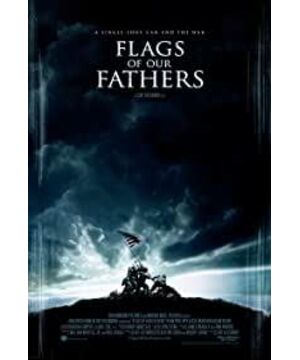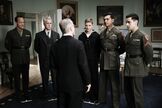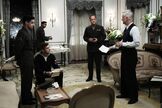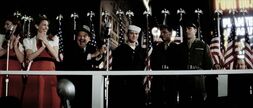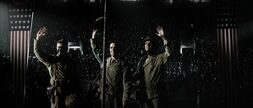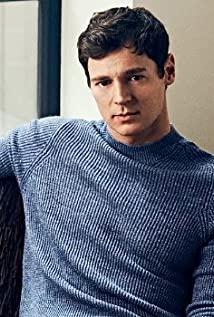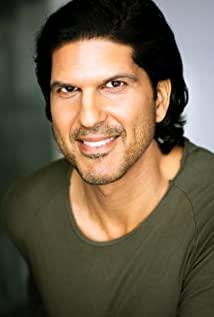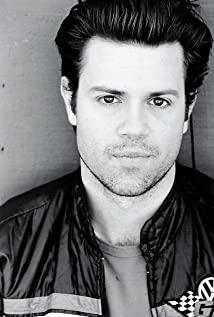When I first saw it, I thought it was the best war movie I've ever seen.
The story is about the male medic's son who stumbles across his father's Medal of Honor while rummaging through his dad's belongings, never knowing his father was a hero. Driven by his father's low profile and curiosity, the son sets out to investigate his father's glorious deeds and resurfaces a forgotten incident.
In 1944, a group of recruits was sent to attack the military stronghold of Iwo Jima. After a difficult advance, in order to boost morale, the commander sent someone to plant an American flag on Mount Oriba. But after the first batch of flags were planted, the admiral took a fancy to them and ordered the first one to be removed for storage, and the flag-raiser of the second flag that was replaced was photographed by reporters - the famous "American Flag". Inserted on Zhebo Mountain", and the fate of the male protagonist and his comrades, the messenger and the chief (Indian soldier) has also changed because of this.
The rhythm of this film is slow, but the director's flexible use of the interspersed three timelines and excellent lens display make the viewing process not much affected. Then, the editing of the war scenes is not clear enough. The director likes to use "shoot who will die" to express the cruelty of the war, but it also lacks a touch of realism; and the design of the sound effects is also slightly dull, and the gunshots are not well used to set off the atmosphere. However, the production of the big scenes and the special effects of the war are very good, and the interspersed are also stopped, so that the shortcomings are also greatly covered up.
This film reflects the war by the vertical flag oolong of the three protagonists, and the starting point is intriguing. When the comrades fell into the water and drowned mercilessly, the cruelty of the war began to gradually reveal. What the film wants to express on the surface is the relationship between heroes and war.
What is a hero? In the face of war, life and death are just the passing of a bullet. Some people died in foreign countries, some were still alive, and those who were alive became heroes. Like the flag-bearers, the medics and comrades were the only ones alive, so they became heroes—or at least they were treated like heroes. And the Finance Minister's words also revealed the truth: "I don't care who planted the first flag at all, I just need you to give speeches and incite people to buy government bonds." At this time, I finally realized that a hero is nothing more than a Just a belief. Just like the American flag on Mount Zhebo, it boosts people's morale, because it has become the hope of the soldiers. This small flag represents hope, liberation, and victory! The male protagonists are actually the same as the other soldiers who died in action, but they are well known to people. People need faith, heroes, and someone who gives them hope of victory. "Heroes are created by us, we need heroes." War makes us need spiritual support, and heroes are born.
Once it will be done, the bones will die. When the comrades in arms died one by one, the male protagonists were enjoying high-level treatment. "Real heroes remain on the battlefield." There's no reason why we shouldn't believe that heroes are just mortals. The victory of a war requires not only the heroes, but also the bravery of the soldiers. But the dead will be forgotten in the end, just like the male protagonists after the war, their careers have hit a wall - remember how admirable and loving they were during the war? ! The chief was even more impoverished, and died of alcoholism on the ranch. There is a kind of sadness here, a kind of sadness like "Artificial Intelligence" "I have been here, I have existed." Only the soldiers remember how much they have paid for their motherland? How long have you been fighting for peace. Like a medical soldier, he lived a low-key life and never mentioned his heroic deeds, but he himself will never forget that he is a hero.
Peeling off the cloak of war reveals the naked human nature.
I think the most flesh and blood in this film is the chief, because when he enjoys love, he will not forget that his comrades die one by one. The medics also shoulder their due missions on the battlefield, and do not forget to treat the wounded when they are injured. More or less, the director praised the beauty of human nature in this film, just like in the end of the film, the flag-raisers rushed to the sea to play after completing their tasks. They seemed to be a group of children, innocent and innocent. Although war may be cruel, it will not destroy people's beautiful hearts. A truly kind person will always have a clear conscience. The beauty of human nature is always the light in the dark.
When darkness comes, who blocks the darkness from the light?
View more about Flags of Our Fathers reviews


